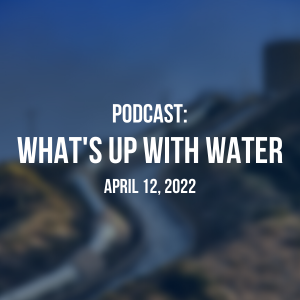The Stream, April 13, 2022: Water Pollution Tops Environmental Concerns in the U.S., Poll Finds
YOUR GLOBAL RUNDOWN
- A new study discovers high concentrations of toxic metals across semi-urban, Hispanic communities in the United States.
- Nearly two dozen Iranians were sentenced to prison for taking part in a 2015 protest over water diversions.
- Public concern over environmental quality and water contamination in the United States is climbing to record-highs.
- The construction of a fertilizer mine in central Michigan could damage nearby wetlands and contaminate water supplies, conservationists say.
Environmental groups in Australia oppose an agriculture project that could harm the surrounding tropical savannah.
“Water isn’t endless.”
– Kirsty Howey of the Northern Territory Environment Centre.
Environmental groups say that plans to boost food production in Australia’s Northern Territory could drastically alter water supplies in Western Australia. Earlier this year, the Northern Territory Land Corporation released 67,500 hectares of land for the Keep Plains Development, a project aimed at expanding fruit, nuts, and cotton production. The project will also require massive amounts of water for irrigation, which critics say may harm what’s left of the region’s biodiverse ecosystem. The developer chosen to oversee the project still must obtain environmental and Aboriginal heritage permits before the project can be completed.
In Recent Water News
What’s Up With Water — April 12, 2022 — This week’s episode of What’s Up With Water covers a recent report from the United nations climate panel and the ripple effect of war in Ukraine. Plus, Circle of Blue reports on how inflation is affecting U.S. water utilities.
Hispanic Communities Often Face Higher Concentrations of Toxic Metal in Drinking Water Supplies, Study Finds
A recent study found high concentrations of metals like uranium are common in water systems serving Hispanic communities across the United States. The study analyzed around 13 million records in order to develop average metal concentrations for 37,915 community water systems nationwide. The analysis discovered that average uranium concentrations in more than two percent of these systems exceeded EPA maximum levels between 2000 and 2011. Levels were disproportionately elevated in semi-urban, Hispanic communities, raising questions around environmental justice.
This Week’s Top Water Stories, Told In Numbers
7 YEARS IN PRISON
More than 20 people in Iran were sentenced to seven years in prison and 74 lashes for protests over water shortages in 2015. The protesters were arrested after staging a demonstration against a water pipeline that would have transferred supplies from their town in Chaharmahel-Bakhtiari province. Those arrested were charged with “disturbing public order,” but maintain that their protests were peaceful.
57% OF U.S. ADULTS
Public concern over environmental quality in the United States is near a two-decade high, according to a recent Gallup poll. Water issues topped the list of Americans concerns. Overall, 57 percent of U.S. adults cited drinking water contamination as a major fear, followed by pollution of waterways and loss of tropical rain forests. Only 28 percent of Americans said they were “not at all” worried about the state of the environment, while 44 percent worry “a great deal.”
On the Radar
A proposed potash mine in central Michigan has raised concerns over water supplies and contamination. The mine has been in the works since 2012, but sanctions in Russia – which, along with ally Belarus, provides 40 percent of the world’s supply of the common fertilizer – have kicked the project into high gear. Michigan Potash & Salt, the company responsible for the plant, obtained the last of the necessary permits it needs to begin construction in December. Residents worry that the operation, which relies on a water-intensive form of mining, will cause irreversible damage to nearby wetlands and contaminate local water supplies. Michigan Potash insists that it will recycle most of the water it pumps from the ground, but state conservationists say the risks outweigh the benefits.
More Water News
Drought in the U.S. Southern Plains could prove devastating this summer.
An unprecedented water conservation plan in Chile would cause daily water cuts in various areas of Santiago.
An ancient lake in Oregon that is a migratory kingdom to waterbirds around the world is drying up due to overextraction of groundwater.
Jane is a Communications Associate for Circle of Blue. She writes The Stream and has covered domestic and international water issues for Circle of Blue. She is a recent graduate of Grand Valley State University, where she studied Multimedia Journalism and Women, Gender and Sexuality Studies. During her time at Grand Valley, she was the host of the Community Service Learning Center podcast Be the Change. Currently based in Grand Rapids, Michigan, Jane enjoys listening to music, reading and spending time outdoors.






Leave a Reply
Want to join the discussion?Feel free to contribute!